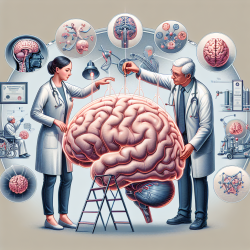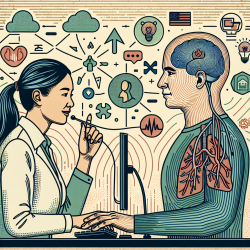Introduction
The role of neuropsychologists in movement disorders teams, particularly those involving Deep Brain Stimulation (DBS), is critical yet often underappreciated. The research article, "The Role of a Neuropsychologist on a Movement Disorders Deep Brain Stimulation Team," provides a comprehensive roadmap for integrating neuropsychologists into these teams. This blog will explore how practitioners can leverage these insights to enhance their skills and improve patient outcomes.
Understanding the Role of Neuropsychologists
Neuropsychologists bring a unique set of skills to DBS teams, including expertise in functional neuroanatomy, assessment, and behavior. Their involvement is crucial in identifying neurocognitive and neurobehavioral symptoms that often accompany movement disorders like Parkinson's Disease (PD). These symptoms can be more distressing than motor symptoms, making neuropsychological evaluations indispensable.
Key Skills and Competencies
Practitioners aiming to enhance their skills should focus on the following areas:
- Functional Neuroanatomy: Understanding the neural circuits involved in movement disorders is essential for predicting potential neurocognitive symptoms.
- Assessment and Psychometrics: Proficiency in measuring neurobehavioral variables and tracking changes over time is crucial for evaluating treatment safety and efficacy.
- Behavioral Observation and Communication: Effective communication with patients, families, and team members is vital for successful case management.
Implementing Research Insights
Neuropsychologists are pivotal in assessing patients' cognitive and behavioral profiles pre-operatively. This assessment helps identify potential risks and guide treatment decisions. Practitioners can enhance their skills by:
- Engaging in interdisciplinary team meetings to advocate for neuropsychological perspectives.
- Utilizing standardized protocols for neuropsychological assessments to ensure consistency and reliability.
- Participating in ongoing education and training to stay updated with the latest research and guidelines.
Encouraging Further Research
While existing research underscores the importance of neuropsychologists in DBS teams, there is a need for more studies to quantify their impact on patient outcomes. Practitioners are encouraged to engage in research initiatives and contribute to the growing body of evidence supporting neuropsychological interventions in movement disorders.
Conclusion
Integrating neuropsychologists into DBS teams enhances patient care by addressing complex neurocognitive and neurobehavioral challenges. Practitioners can improve their skills by embracing the insights from this research and advocating for the inclusion of neuropsychological expertise in movement disorder teams.
To read the original research paper, please follow this link: The Role of a Neuropsychologist on a Movement Disorders Deep Brain Stimulation Team.










